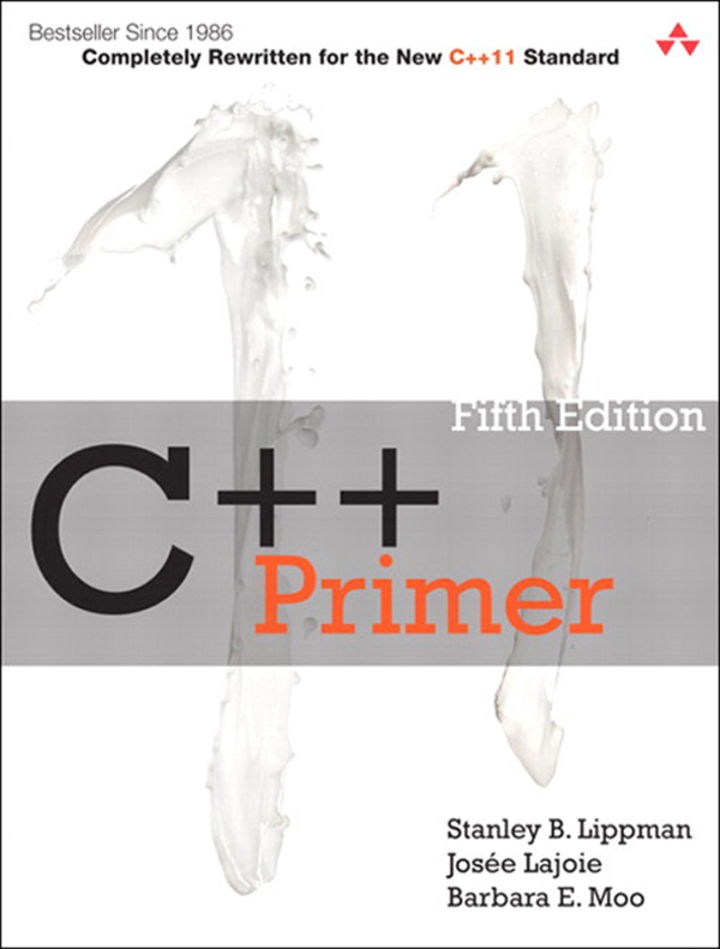
C++ Primer, 5th edition
PUBLISHER: PEARSON
eBook edition. 1 Year Subscription. Dành cho Cá nhân | Trường ĐH, Nhóm, Thư Viện: Gọi 0915920514 để báo giá Pearson, Vital Source eBook hoặc mua Sách In
Trong khi vẫn duy trì uy tín và chất lượng của một cuốn sách đã bán được hơn 500.000 bản, ấn bản thứ Năm này không phải là cuốn sách C++ Primer của cha bạn. Nó đã được sửa đổi và viết lại hoàn toàn để phù hợp với cách sử dụng C++ ngày nay. và để bao gồm tiêu chuẩn C++ 2011 được phát hành gần đây. Những sinh viên mới làm quen với C++ sẽ tìm thấy phần giới thiệu rõ ràng và có tổ chức thực tế về ngôn ngữ được tăng cường nhờ nhiều công cụ hỗ trợ sư phạm. Học sinh quay lại C++ sẽ có thể cập nhật kiến thức của mình bằng tài liệu mới về cách sử dụng thư viện và phong cách lập trình C++.Truy cập mã nguồn cho các ví dụ mở rộng từ infoit.com/title/0321714113
- Preface xxiii
- Chapter 1: Getting Started 11.1 Writing a Simple C++ Program 21.2 A First Look at Input/Output 51.3 A Word About Comments 91.4 Flow of Control 111.5 Introducing Classes 191.6 The Bookstore Program 24Chapter Summary 26Defined Terms 26 Part I: The Basics 29
- Chapter 2: Variables and Basic Types 312.1 Primitive Built-in Types 322.2 Variables 412.3 Compound Types 502.4 const Qualifier 592.5 Dealing with Types 672.6 Defining Our Own Data Structures 72Chapter Summary 78Defined Terms 78
- Chapter 3: Strings, Vectors, and Arrays 813.1 Namespace using Declarations 823.2 Library string Type 843.3 Library vector Type 963.4 Introducing Iterators 1063.5 Arrays 1133.6 Multidimensional Arrays 125Chapter Summary 131Defined Terms 131
- Chapter 4: Expressions 1334.1 Fundamentals 1344.2 Arithmetic Operators 1394.3 Logical and Relational Operators 1414.4 Assignment Operators 1444.5 Increment and Decrement Operators 1474.6 The Member Access Operators 1504.7 The Conditional Operator 1514.8 The Bitwise Operators 1524.9 The sizeof Operator 1564.10 Comma Operator 1574.11 Type Conversions 1594.12 Operator Precedence Table 166Chapter Summary 168Defined Terms 168
- Chapter 5: Statements 1715.1 Simple Statements 1725.2 Statement Scope 1745.3 Conditional Statements 1745.4 Iterative Statements 1835.5 Jump Statements 1905.6 try Blocks and Exception Handling 193Chapter Summary 199Defined Terms 199
- Chapter 6: Functions 2016.1 Function Basics 2026.2 Argument Passing 2086.3 Return Types and the return Statement 2226.4 Overloaded Functions 2306.5 Features for Specialized Uses 2366.6 Function Matching 2426.7 Pointers to Functions 247Chapter Summary 251Defined Terms 251
- Chapter 7: Classes 2537.1 Defining Abstract Data Types 2547.2 Access Control and Encapsulation 2687.3 Additional Class Features 2717.4 Class Scope 2827.5 Constructors Revisited 2887.6 static Class Members 300Chapter Summary 305Defined Terms 305 Part II: The C++ Library 307
- Chapter 8: The IO Library 3098.1 The IO Classes 3108.2 File Input and Output 3168.3 string Streams 321Chapter Summary 324Defined Terms 324
- Chapter 9: Sequential Containers 3259.1 Overview of the Sequential Containers 3269.2 Container Library Overview 3289.3 Sequential Container Operations 3419.4 How a vector Grows 3559.5 Additional string Operations 3609.6 Container Adaptors 368Chapter Summary 372Defined Terms 372
- Chapter 10: Generic Algorithms 37510.1 Overview 37610.2 A First Look at the Algorithms 37810.3 Customizing Operations 38510.4 Revisiting Iterators 40110.5 Structure of Generic Algorithms 41010.6 Container-Specific Algorithms 415Chapter Summary 417Defined Terms 417
- Chapter 11: Associative Containers 41911.1 Using an Associative Container 42011.2 Overview of the Associative Containers 42311.3 Operations on Associative Containers 42811.4 The Unordered Containers 443Chapter Summary 447Defined Terms 447
- Chapter 12: Dynamic Memory 44912.1 Dynamic Memory and Smart Pointers 45012.2 Dynamic Arrays 47612.3 Using the Library: A Text-Query Program 484Chapter Summary 491Defined Terms 491 Part III: Tools for Class Authors 493
- Chapter 13: Copy Control 49513.1 Copy, Assign, and Destroy 49613.2 Copy Control and Resource Management 51013.3 Swap 51613.4 A Copy-Control Example 51913.5 Classes that Manage Dynamic Memory 52413.6 Moving Objects 531Chapter Summary 549Defined Terms 549
- Chapter 14: Overloaded Operations and Conversions 55114.1 Basic Concepts 55214.2 Input and Output Operators 55614.3 Arithmetic and Relational Operators 56014.4 Assignment Operators 56314.5 Subscript Operator 56414.6 Increment and Decrement Operators 56614.7 Member Access Operators 56914.8 Function-Call Operator 57114.9 Overloading, Conversions, and Operators 579Chapter Summary 590Defined Terms 590
- Chapter 15: Object-Oriented Programming 59115.1 OOP: An Overview 592 15.2 Defining Base and Derived Classes 59415.3 Virtual Functions 60315.4 Abstract Base Classes 60815.5 Access Control and Inheritance 51115.6 Class Scope under Inheritance 61715.7 Constructors and Copy Control 62215.8 Containers and Inheritance 63015.9 Text Queries Revisited 634Chapter Summary 649Defined Terms 649
- Chapter 16: Templates and Generic Programming 65116.1 Defining a Template 65216.2 Template Argument Deduction 67816.3 Overloading and Templates 69416.4 Variadic Templates 69916.5 Template Specializations 706Chapter Summary 713Defined Terms 713 Part IV: Advanced Topics 715
- Chapter 17: Specialized Library Facilities 71717.1 The tuple Type 71817.2 The bitset Type 72317.3 Regular Expressions 72817.4 Random Numbers 74517.5 The IO Library Revisited 752Chapter Summary 769Defined Terms 769
- Chapter 18: Tools for Large Programs 77118.1 Exception Handling 77218.2 Namespaces 78518.3 Multiple and Virtual Inheritance 802Chapter Summary 816Defined Terms 816
- Chapter 19: Specialized Tools and Techniques 81919.1 Controlling Memory Allocation 82019.2 Run-Time Type Identification 82519.3 Enumerations 83219.4 Pointer to Class Member 83519.5 Nested Classes 84319.6 Union: A Space-Saving Class 84719.7 Local Classes 85219.8 Inherently Nonportable Features 854Chapter Summary 862Defined Terms 862 Appendix A: The Library 865A.1 Library Names and Headers 866A.2 A Brief Tour of the Algorithms 870A.3 Random Numbers 882 Index 887















